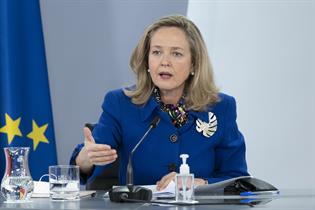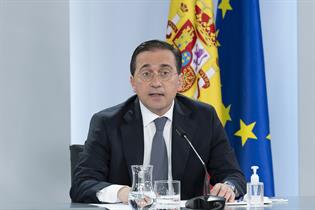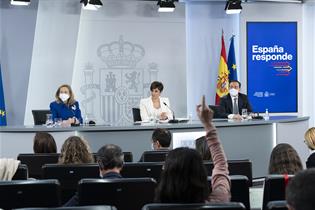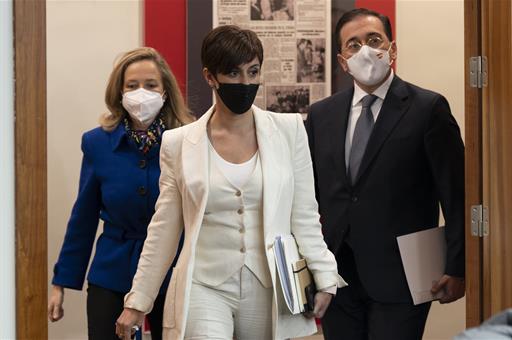Council of Ministers
The Government of Spain promotes an independent authority for the defence of financial customers
Council of Ministers - 2022.4.5
Moncloa Palace, Madrid
The Government has agreed to promote the draft bill for the creation of the Independent Authority for the Defence of Financial Customers, which will now be submitted to a public hearing to receive contributions from interested parties.
The First Vice-President of the Government of Spain and Minister for Economic Affairs and Digital Transformation, Nadia Calviño, explained that the final text is expected to be submitted to Parliament for debate and approval in the second half of the year.
The future regulation has a twofold objective: to strengthen the system of out-of-court settlement of complaints between institutions and customers of banking, securities and insurance products, and to promote financial education and inclusion.
Calviño stressed that these areas are "priorities" for strengthening consumer protection and reducing the high level of litigation, "which is a cost for citizens in terms of money, time and impact on their lives", as well as a significant burden on the legal system.
A free, fast and binding complaints system
 Foto: Pool Moncloa/Borja Puig de la BellacasaThe Independent Authority will provide more effective protection for financial users by centralising the complaints services of the Bank of Spain, the National Securities Market Commission and the Directorate-General of Insurance and Pension Funds in a single body.
Foto: Pool Moncloa/Borja Puig de la BellacasaThe Independent Authority will provide more effective protection for financial users by centralising the complaints services of the Bank of Spain, the National Securities Market Commission and the Directorate-General of Insurance and Pension Funds in a single body.
Its decisions will be issued swiftly within a maximum period of 90 days and will be binding on financial institutions for claims of less than 20,000 euros, so that non-compliance will be sanctioned.
The system will be free of charge for customers, as the Authority will be funded by a 250 euros fee to the institutions for each successful complaint. The procedure will be easily accessible, will not require a solicitor or barrister and will be provided by electronic and face-to-face means. Furthermore, Calviño underlined that a helpdesk will be set up for the lodging of complaints.
Improving customer service, protection and financial education
The regulation will also help to improve customer service and ensure financial inclusion, particularly for the elderly and vulnerable groups.
The Vice-President of the Government recalled that a first step was taken last February when the banking associations signed an updated 'Strategic Protocol to Strengthen the Social and Sustainable Commitment of the Banking Sector', which includes measures to guarantee personalised attention to citizens, especially the elderly, so that they have access to banking services adapted to their needs.
However, he pointed out that"these are not just voluntary commitments" but need to be enforced and consumer protection strengthened. To this end, the regulation will form part of a new regulatory framework alongside the Law for Protection of Consumers and Users in Situations of Social and Economic Vulnerability, which entered into force in February, and the Law to Regulate Business Customer Service, the draft of which was approved in November.
Nadia Calviño ended by stressing the need to promote financial education among citizens and to strengthen their digital skills to interact with a sector "whose digital transformation has accelerated exponentially as a result of the pandemic". The Authority will promote training through activities and the dissemination of contents and guides, among other actions.
Expulsion of Russian diplomats
 Foto: Pool Moncloa/Borja Puig de la BellacasaThe Council of Ministers has decided to expel a group of Russian diplomats and staff of the Embassy of the Russian Federation in Spain.
Foto: Pool Moncloa/Borja Puig de la BellacasaThe Council of Ministers has decided to expel a group of Russian diplomats and staff of the Embassy of the Russian Federation in Spain.
The Minister for Foreign Affairs, European Union and Cooperation, José Manuel Albares, has specified that there are some 25 people who "represent a threat to the security interests of our country". The decision is also a response to crimes that cannot go unpunished and must be thoroughly investigated, he added.
Albares stated that the images of the massacre of civilians in the Ukrainian town of Bucha following the withdrawal of the Russian army are "unbearable" and "outrageous", and represent a turning point in the face of which the international community cannot remain impassive and must demand a forceful response.
"Spain demands that war crimes be investigated immediately and that those responsible be punished for them," he stressed.
The move is part of an ongoing process in Europe that has already been joined by Belgium, Poland, the Czech Republic, Ireland, the Netherlands, France, Germany, Denmark, and Italy, in addition to the European External Action Service headed by the High Representative of the Union for Foreign Affairs and Security Policy, Spain's Josep Borrell.
The minister will begin a round of contacts with the parliamentary groups to provide them with full details of the decision and to seek their support.
In addition, José Manuel Albares conveyed the government's solidarity with the victims and their families and reiterated that the Ukrainian people are not alone: "Spain will continue to support Ukraine in the face of Russian aggression that literally knows no bounds.
On the other hand, the Foreign Affairs Minister confirmed that the President of the Government of Spain, Pedro Sánchez, will travel to Morocco next Thursdaywhere he will meet with King Mohamed VI, as agreed last week during a telephone conversation. After the meeting, the king invited the Chief Executive to break his fast, which is "a very strong sign of friendship", remarked Albares.
Indefinite-term contract in the Public Science System
 Foto: Pool Moncloa/Borja Puig de la BellacasaThe Government has approved a Royal Decree-Law that makes it easier for public entities, consortiums and foundations to contract indefinitely in the Public Science System.
Foto: Pool Moncloa/Borja Puig de la BellacasaThe Government has approved a Royal Decree-Law that makes it easier for public entities, consortiums and foundations to contract indefinitely in the Public Science System.
The Minister for Territorial Policy and Government Spokesperson, Isabel Rodríguez, explained that the measure is in line with the labour reform and is included in the a reform of the Science Law currently being processed in Parliament.
The regulation offers more job stability and will benefit thousands of researchers, technical and management staff who are currently on temporary contracts, he said.
The new contract will not be subject to a public offer of employment or replacement rate and will not require prior authorisation if its financing is external or comes from competitive calls for tender. In addition, in the event that the research group continues to be funded, contracts may be extended without the need for a new contract.
285 million euros for digital skills training
The Executive has approved the distribution among the regional government of 285 million euros for the training of teachers in digital competence and for the preparation of some 22,000 schools.
The goal is to have highly digitally qualified teachers and digitisation-ready schools, so that students can get the most from this process.
Isabel Rodríguez indicated that this investment is in addition to the investment already made in 2021, making a total government allocation of around 1,300 million euros in a period of 16 months for digitisation in the field of education.
He also recalled that yesterday the President of the Government of Spain announced a new Strategic Project for Economic Recovery and Transformation (PERTE) in the field of microchips and semiconductors with the aim that Spain will lead the sector.
38.5 million for vulnerable students
In the field of education, the Executive has also approved the distribution of 38.5 million euros for the creation of personal and family accompaniment and guidance units for vulnerable students. The aim of these units is to prevent school failure and early drop-out and to promote successful school careers.
The spokeswoman specified that 804 new units will be set up, not only for pupils with learning difficulties, but also for those who, due to their high abilities, are also at risk of dropping out early.
Decent work for domestic workers
 Foto: Pool Moncloa/Borja Puig de la BellacasaThe Council of Ministers has agreed to refer the International Labour Organisation's Convention on decent work for domestic workers to Parliament for ratification. The text sets out that this group must enjoy the same social protection and working conditions as other workers.
Foto: Pool Moncloa/Borja Puig de la BellacasaThe Council of Ministers has agreed to refer the International Labour Organisation's Convention on decent work for domestic workers to Parliament for ratification. The text sets out that this group must enjoy the same social protection and working conditions as other workers.
Isabel Rodríguez pointed out that, at present, the system deprives them of the right to unemployment and other benefits and that the ratification of the agreement redresses this situation.
Current Affairs
During her speech at the press conference following the Council of Ministers, the spokesperson referred to the unemployment figures for March, which show that one in three contracts signed is permanent, daily contracts have fallen by almost 20% and unemployment has fallen by 840,000 people in the last year. "These are positive data on one of the structural reforms that is important for the government: the labour reform", he stressed.
Non official translation





